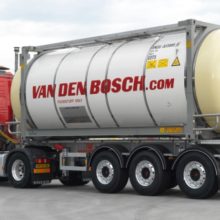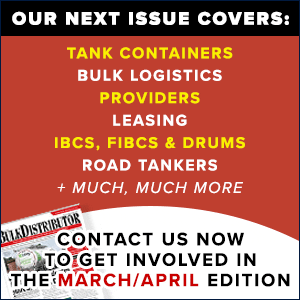
Business: Intermodal bulk logistics
Headquarters: Erp, the Netherlands
Presence: Europe, Africa, Middle East
Size: 500 employees
Resources:
• 250 trucks; 1,000 in daily use
• Approx. 1,000 trailers and chassis
• 4,500 containers
Annual transported About 3 billion product volume: kilograms
Van den Bosch Transporten is a bulk logistics provider that specializes in transporting liquids and dry bulk products for food (beer, chocolate, sugar) and non-food (plastics, minerals, oils & fats) industries. It is one of the top five bulk transporters in Europe and is expanding into the Middle East and Africa.
The Challenge
The planning puzzle faced by Van den Bosch Transporten is one of the most complex in intermodal bulk transport.
Every product comes with extremely stringent requirements regarding hygiene, temperature, previous loads, shelf life and more. These factors may require that some products only be transported using specialized skills, trucks or containers. For example, a particular product that requires heating during transport immediately limits the number of containers available for the job. This process of resource matching adds yet another layer of complexity to the planning process.
Van den Bosch Transporten found it increasingly difficult to fulfill these requirements while trying to increase delivery performance and improve customer satisfaction. As its business grew, the bulk logistics provider found that the transport management system (TMS) and non-integrated supporting systems it used in its daily planning processes no longer met the new requirements. The use of multiple systems and increasingly complex rules meant that Van den Bosch Transporten’s planners struggled with numerous challenges.
Laborious planning methods
Because the original TMS could not cope with the growing complexity and increasing customer demands, planners had to manually manage a multitude of constraints and requirements such as safeguarding product contamination and cleaning rules, matching resources to orders and deciding on optimal modes of transport.
Visibility challenge
Because Van den Bosch Transporten’s planners worked with multiple non-integrated planning systems, they lacked end-to-end visibility of the activities taking place across the supply chain. This was further complicated as the accurate locations of all required resources were hard to obtain.
Consequences of planning decisions
Lack of integration and real-time propagation meant that planners had limited visibility of the consequences of a single planning decision or the impact of collective decisions made by different planners across the supply chain.
Decentralised data entry
Because its systems were not integrated, Van den Bosch Transporten was not able to incorporate critical data into its planning process. Updating pricing schemes and slot allocation used for intermodal connections, cleaning stations and charter companies drained precious time.
Van den Bosch Transporten’s search for the ideal technology partner to solve its complex logistics puzzle ended with Quintiq.
Logistics Planner, powered by Quintiq’s world record-breaking optimization technology, is the answer to increased visibility and control for Van den Bosch Transporten’s planners. Configured for a 100%-fit to the bulk logistics provider’s business, the solution takes into account all of its unique and highly complex rules and constraints to create plans that advance its business KPIs.
Logistics Planner matches customer orders against a profile of important planning variables. For each order, the solution generates optimized intermodal path suggestions for the planner’s selection. These paths take into account all customer requirements regarding quality standards, contamination rules, cleaning programs and types of resources. Once the optimal path and load unit are determined, Logistics Planner creates intermodal bookings and applies optimized truck assignment suggestions.
The solution’s real-time propagator ensures that all planner actions are automatically dispersed across the entire plan.
The results
Increased visibility and control
Van den Bosch Transporten’s planners are now empowered to make smarter decisions that will advance business KPIs. Logistics Planner’s ability to capture the changes to established plans in a closed feedback loop means that escalations are at an all-time low. Freed from the minutiae of manual planning, planners can now dedicate more of their time and attention to higher-level activities that will bring even greater benefit to Van den Bosch Transporten and its customers.
Decreased planning fulfillment costs
Faster and more accurate planning has led to an overall reduction in Van den Bosch Transporten’s transportation costs. Logistics Planner optimizes the allocation of orders to containers to trucks and trailers, and defines optimal paths for load units in the intermodal networks. By adhering to container safety stocks at all times, the solution ensures that containers are perfectly balanced throughout the network.
Increased customer service levels
Quintiq’s superior planning and optimization capabilities enable Van den Bosch Transporten to automatically adhere to customer cleaning requirements and deliver products within agreed timeframes ― consistently. As a result, it has seen an overall increase in service levels and strengthened relationships with its key, long-term customers.
The next step
The successful implementation of Logistics Planner forms the basis of the next phase of Van den Bosch Transporten’s partnership with Quintiq.
Quintiq will support Van den Bosch Transporten in strengthening its strategy on sustainability by integrating sustainability calculations into every aspect of its planning. By making these calculations an integral part of its process, planners will be able to measure the impact of their actions on the company’s carbon footprint — enabling Van den Bosch Transporten to meet its business goals and truly make a difference as a socially responsible company.
